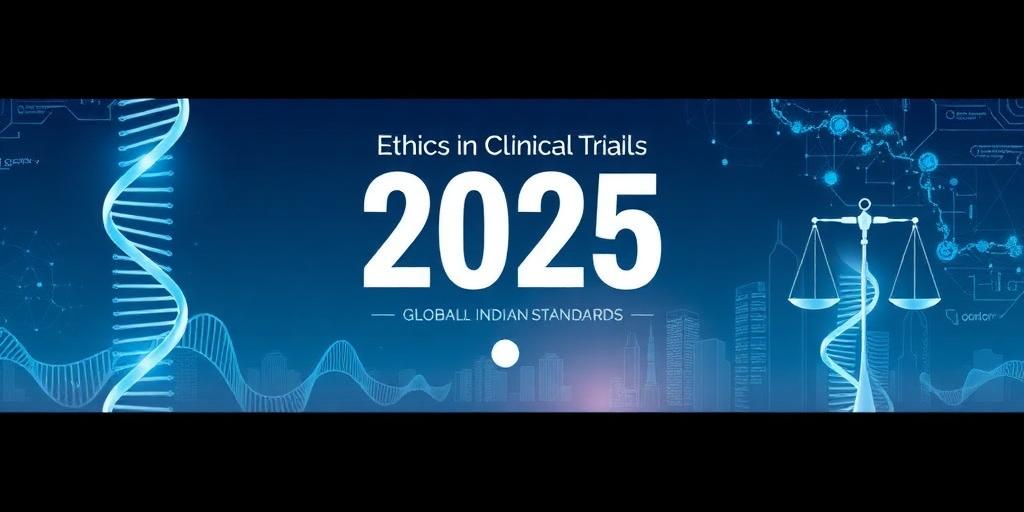The Ethics of Clinical Trials in 2025: India & Global Standards
Clinical trials are essential for advancing medical science and improving healthcare outcomes. However, they also raise complex ethical considerations, especially as we look toward the future. By 2025, both India and the global community will likely face evolving challenges and opportunities in ensuring the ethical conduct of clinical trials. This article examines the current landscape, emerging trends, and key ethical principles that will shape the future of clinical trials.
Current Ethical Frameworks
Global Standards:
- Declaration of Helsinki: This cornerstone document provides ethical principles for medical research involving human subjects. It emphasizes the importance of informed consent, review by an independent ethics committee, and a favorable risk-benefit ratio.
- ICH-GCP Guidelines: The International Council for Harmonisation’s Good Clinical Practice guidelines offer a harmonized standard for clinical trials. They cover aspects such as trial design, conduct, monitoring, and reporting, ensuring data integrity and participant safety.
Indian Regulations:
- New Drugs and Clinical Trials Rules, 2019: These rules govern the approval and conduct of clinical trials in India. They emphasize the rights and safety of trial participants, informed consent, and compensation for injury.
- National Ethical Guidelines for Biomedical and Health Research involving Human Participants: Issued by the Indian Council of Medical Research (ICMR), these guidelines provide detailed ethical principles for research, including clinical trials.
Key Ethical Considerations for 2025
1. Informed Consent in the Digital Age:
As technology advances, so does the potential for digital tools to enhance the informed consent process. By 2025, expect to see more interactive, multimedia-based consent forms that are tailored to individual participants’ understanding. However, this also raises questions about data privacy, security, and the potential for digital coercion.
2. Data Privacy and Security:
With increasing reliance on electronic health records and data sharing, protecting patient data is paramount. Future clinical trials will need robust cybersecurity measures and adherence to data protection regulations like GDPR to prevent breaches and ensure patient confidentiality.
3. Inclusion and Diversity:
Historically, clinical trials have often lacked diverse representation, leading to disparities in treatment outcomes. By 2025, there will be a greater emphasis on including diverse populations in trials to ensure that medical advancements benefit everyone. This includes considering factors like race, ethnicity, gender, age, and socioeconomic status.
4. Post-Trial Access:
Ensuring that participants have access to beneficial treatments after a trial concludes remains a significant ethical challenge. Future guidelines may mandate clearer plans for post-trial access, particularly for life-saving interventions.
5. Transparency and Data Sharing:
Greater transparency in clinical trial data is crucial for building trust and accelerating scientific progress. By 2025, expect to see more open-access data repositories and requirements for sharing trial results, regardless of the outcome.
6. Artificial Intelligence and Clinical Trials:
AI has the potential to transform clinical trials by improving patient selection, predicting outcomes, and streamlining data analysis. However, it also raises ethical concerns about algorithmic bias, lack of transparency, and the potential for dehumanizing the research process. Clear guidelines will be needed to ensure that AI is used ethically and responsibly.
Challenges and Opportunities in India
India faces unique challenges in ensuring the ethical conduct of clinical trials, including:
- Regulatory Capacity: Strengthening regulatory oversight and enforcement is essential to prevent unethical practices and protect trial participants.
- Awareness and Education: Enhancing awareness among participants about their rights and the importance of informed consent is crucial.
- Infrastructure: Investing in research infrastructure and training for healthcare professionals is needed to conduct high-quality clinical trials.
However, India also has significant opportunities:
- Large Patient Population: India’s diverse population provides a valuable resource for conducting clinical trials that can address a wide range of health conditions.
- Skilled Workforce: India has a growing pool of skilled healthcare professionals and researchers who can contribute to clinical research.
- Technological Advancements: Leveraging technology to improve trial efficiency, data management, and patient engagement can enhance the quality and ethics of clinical trials.
Conclusion
The ethics of clinical trials in 2025 will be shaped by technological advancements, evolving societal values, and the need for greater inclusivity and transparency. Both India and the global community must proactively address these challenges to ensure that clinical trials are conducted ethically and contribute to improving human health. By strengthening regulatory frameworks, promoting awareness, and embracing innovation, we can create a future where clinical trials are a force for good.
